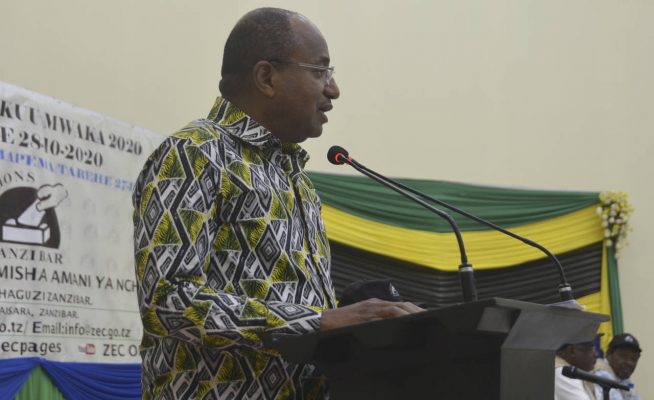
Tanzania’s opposition says vote ‘spit in face of democracy’
NAIROBI, Kenya (AP) — Tanzania’s leading opposition candidate on Thursday rejected Wednesday’s presidential vote after alleging widespread irregularities, saying that whatever happened wasn’t an election and was like “spitting in the face of democracy.” The other main opposition party said one of its top candidates was arrested again.
Many across Africa have watched in dismay at what they’ve described as Tanzania’s abandonment of its long reputation for democratic ideals under populist President John Magufuli. He leads in early results as he seeks a second five-year term.
Opposition leader Tundu Lissu of the CHADEMA party also appeared to warn of unrest: “Those in power are telling Tanzanians, ‘If you want change, look for it another way, not through the ballot box,’” he told reporters. “The message they are sending is, ‘Use force if you can … We won’t let you win through democracy.”
He added, however, that unlike the government, “we do not have the instruments of violence,” and he called for protests by democratic means. He also urged international condemnation of the election process.
Lissu, who survived an assassination attempt in 2017 and returned from exile this year, said he won’t accept the election results, asserting that thousands of observers were turned away from polling stations and those who managed to enter were not given official data.
The other top opposition party, ACT Wazalendo, announced that its presidential candidate in the semi-autonomous region of Zanzibar, Seif Sharif Hamad, was arrested Thursday for the second time in a week, along with nine other party members.
Police did not immediately comment but confirmed at least 70 arrests in the past two days in election-related incidents. Streets into Zanzibar’s main city, Stone Town, were blocked.
“Tanzania in full blown one party dictatorship. We shall resist this,” ACT Wazalendo chair Zitto Kabwe tweeted, later alleging that one of the arrested party members was badly beaten. “I ask the international community NOT to recognize this Tanzanian election.”
The East African nation’s electoral commission has denied allegations of voting irregularities in one of Africa’s most populous countries and fastest-growing economies. Election results could be announced Friday.
The commission released results for 18 out of 264 constituencies, showing Magufuli with the early lead. The ruling Chama Cha Mapinduzi party, in power since independence in 1961, has won a majority of seats in the legislative assembly. The CHADEMA opposition party chair, Freeman Mbowe, lost his seat.
Some Magufuli critics have expressed concerns that if the ruling party wins enough seats in parliament, the president might try to change the constitution to extend the two-term limit.
The election turnout appeared to be below 50%, according to the early figures. Some 29 million people registered to vote.
Magufuli has been widely criticized for repressive measures against dissenting voices, including a ban on opposition political gatherings in 2016 and the targeting of media outlets. Opposition figures ahead of the vote were arrested, blocked from traveling to rallies or even disqualified.
“Tanzania championed freedoms and the independence of the continent, including leading the formation of the African Union … many people look at Tanzania for a sense of prestige and pride,” Deprose Muchena with Human Rights Watch told a briefing Thursday. “Today, all those ideals are being contested.”
He said Tanzania instead was joining the ranks of countries like Zimbabwe.
Tanzania Elections Watch, a regional group of eminent persons, expressed concerns about the credibility and conduct of the election, noting deadly violence on the eve of the vote in Zanzibar, a massive disruption in internet and text messaging services and the reported arrests of other candidates on election day.
“Unfortunately, in Tanzania the announcement made by the National Electoral Commission is final,” the group’s co-chair Frederick Ssempebwa told a briefing, as results cannot be challenged in court. “There is no avenue for the aggrieved parties to air their views.”

